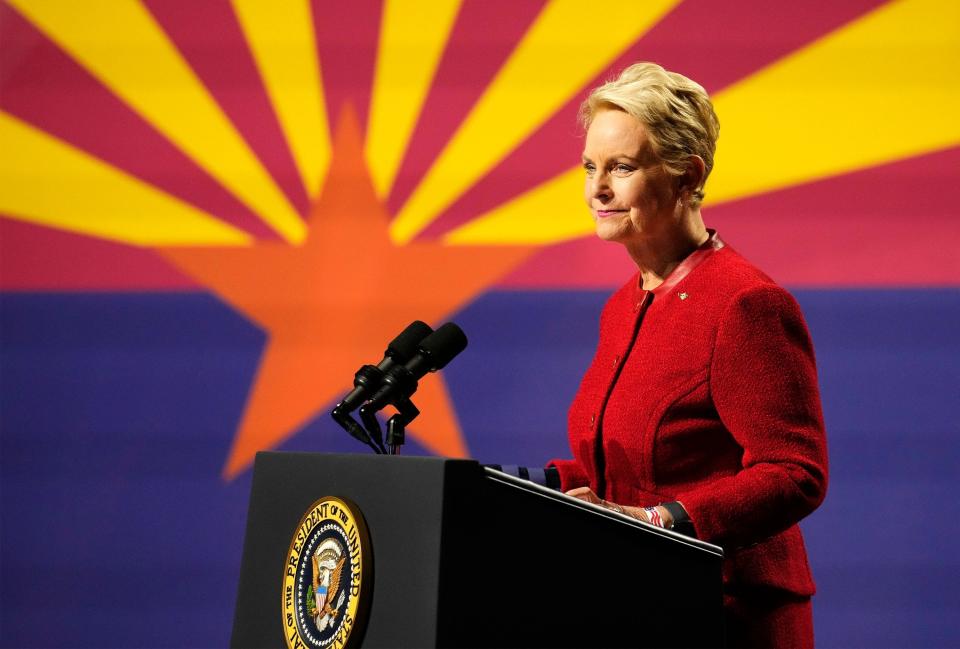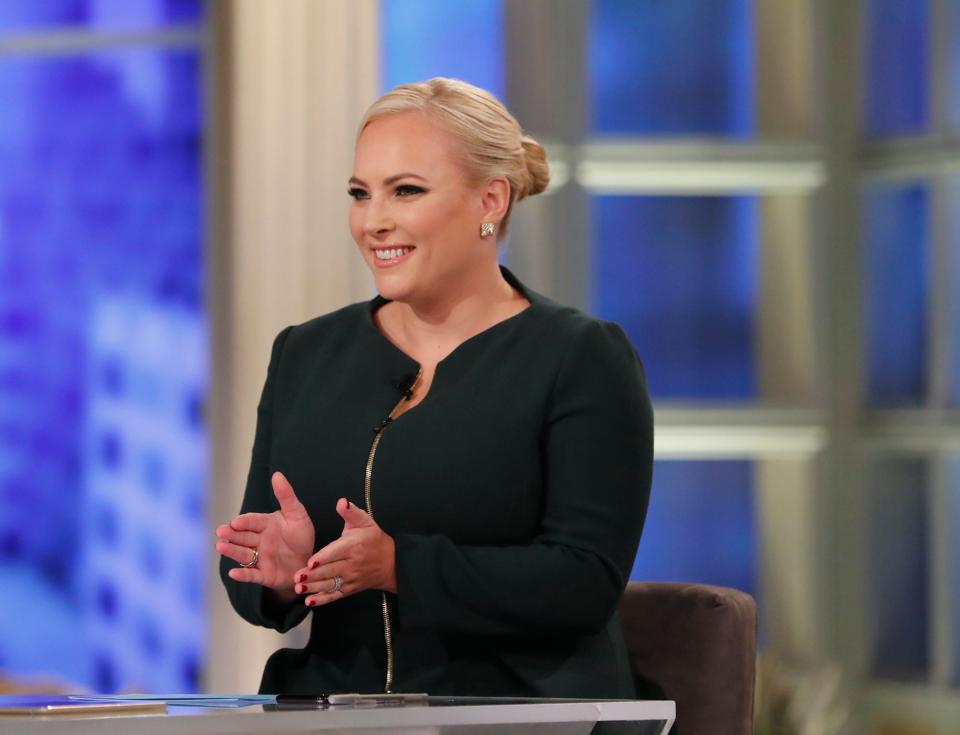Israel’s siege pushes Gaza toward famine. Arizona’s Cindy McCain discusses what needs to happen
- Oops!Something went wrong.Please try again later.
- Oops!Something went wrong.Please try again later.
- Oops!Something went wrong.Please try again later.
Her work helps feed more than 100 million people every year. But these days, what keeps Cindy McCain awake at night is the thought of the people the World Food Programme can’t reach.
Based in Rome, the Arizona diplomat now leads the United Nations’ food assistance branch at a time when Russia’s war in Ukraine, the COVID-19 pandemic, and climate change-fueled natural disasters are aggravating food shortages around the world.
Approaching 10 months in her position, the blinking red light on her radar is Gaza: the Palestinian territory under siege from Israel which, by her agency’s estimates, is facing one of the most acute hunger crises since the organization began systematically recording them.
McCain is a multi-decade veteran of humanitarian work. She founded the American Voluntary Medical Team, a non-profit that delivered medical care to poor or war-torn countries around the world, and she served as the U.S. ambassador to the U.N.’s food and agriculture agencies for two years before stepping into her current role. Still the situation in Gaza shakes her.

“It’s a desperate situation. I’ve seen many war zones. I’ve seen many areas where starvation is rampant. But this is like none other that we’ve seen before,” McCain said.
Gaza leaned heavily on international aid even before the latest hostilities began on Oct. 7, 2023, when the Palestinian militant group Hamas killed around 1,200 people and took some 250 hostages in a surprise attack on Israel.
Israel since has bombed the densely populated territory and cut off most of the flow of food, water, fuel and medicine to the two million people who live there, saying its aim is to eliminate Hamas. Israel’s response is estimated to have killed upwards of 25,000 people, or 1% of Gaza’s population, according to the Hamas-run health ministry. It is unclear how many of those killed are combatants.
The World Food Programme is warning that Israel's military campaign could push Gaza into an all-out famine. McCain has echoed the U.N.’s calls for an end to the fighting.
“Any time there’s conflict … it’s a terribly difficult place to work in,” McCain said. “You’ve read about the difficulties we’ve had getting our trucks in. Now that we’re getting some of our trucks in, we’re still not getting enough trucks in. And on occasion, once we get over the border into Gaza, there are problems of being able to distribute it to those who need it.”
“These people are simply trying to feed their families,” she said. “That’s why we need a ceasefire, that’s why we need to get more aid in, so that people aren’t desperate.”
'No place to go' for people in Gaza, McCain says
Assessments by the World Food Programme and its partner organizations paint a grim picture of life on the ground in Gaza. Their latest report found that more than 90% of the enclave’s population was facing “crisis”-level hunger or worse, meaning that malnutrition is up, or people are just barely able to feed themselves.
Between December and February, the Gaza Strip’s “entire population” fell into that category. “This is the highest share of people facing high levels of acute food insecurity” that has ever been recorded “for any given area or country,” the report notes.
The report’s bottom line: if the status quo continues, “there is a risk of famine occurring within the next six months.”
McCain stressed that war is the biggest risk factor. According to the U.N.’s emergency relief coordinator, 1.9 million people in Gaza have been displaced amid Israel’s military operations, out of a total population of around 2.3 million.
Often, though, civilians can take refuge in neighboring countries, McCain said. “In the case of Gaza, they’ve not been able to migrate. So we are seeing an extraordinarily deep and tight group of people living together like this. There’s no place to go.”
That’s creating a “perfect storm for a humanitarian catastrophe,” she said.
A pause in the fighting is at the moment an uncertain prospect that faces immense political headwinds in the U.S. and abroad. Negotiators are said to be approaching a deal that would establish a two-months-long ceasefire, in exchange for Hamas’ release of hostages they took on Oct. 7.
Leaders within the Democratic Party are divided in their support for a permanent ceasefire. And the Republican Party, to which McCain’s husband, the late six-term Sen. John McCain, belonged, has criticized calls for a ceasefire as allowing Hamas to re-arm or inappropriately dictating the military response of a key U.S. ally.
McCain herself has faced tensions with World Food Programme staffers who have urged her to adopt more pointed criticism of Israel. Meanwhile, the day after she urged a ceasefire in an appearance on CNN, her daughter took the opposite view on social media.
“No ceasefire. Release the hostages,” Meghan McCain, a political commentator, wrote.

Added to the mix is last week’s explosive revelation that a dozen members of the U.N.’s agency for Palestinians were involved in Hamas’ Oct. 7 attack, according to Israeli intelligence that the U.S. has yet to corroborate. Biden on Friday halted U.S. financial support to the agency, and several other countries have followed suit. The agency said those cuts will force it to suspend lifesaving aid at a time when famine is looming.
As a U.N. surrogate, McCain said it’s not her place to weigh in on the politics of a ceasefire or comment on U.S. diplomatic efforts. Instead, she made the case that widespread hunger in Gaza poses security risks of its own.
“When a family cannot feed their children, or feed their sons, for example … they’re recruited into these organizations that are nefarious because there’s food. They entice them with food,” she said. “That’s why I think it’s an absolute imperative that we make sure that we feed our younger folks in all of this first.”
“I approach this strictly as a humanitarian. All I can tell you is that people are starving to death and we need to get in there and feed them. … A ceasefire would make this much better for us, and for us to be able to deliver to people who are desperately in need,” she said.
Cindy McCain: 'I've learned it firsthand, just how fragile human life is'
Gaza is just one front in the World Food Programme’s efforts to mitigate hunger.
Russia’s invasion of Ukraine, the “breadbasket of Europe,” has caused food prices to go up, contributing to acute food shortages in many African countries and raising the cost of delivering aid to food-insecure people worldwide. The agency also faces a multi-billion-dollar funding shortfall that has forced it to implement “massive reductions” in nearly half of its operations around the world.
Running the organization is a daunting task, McCain said. And it reminds her of a difficult truth at the core of humanitarian work.
“Not that I needed to learn this, but I’ve learned it firsthand, just how fragile human life is, especially children’s lives,” she said. “It’s one thing to go in for the first time, and go at it with wide eyes, but when you become a seasoned veteran like I have, you learn the fragility of life, and the intense ability for one human to take a toll on another human.”
During those moments, the memory of her late husband, who died in 2018, helps sustain her.
“He inspires me every day,” McCain said. “The days I can’t feed people because we don’t have enough, or the days I figure out there’s another crisis. … Those are the days I lean on his spirit, and his memory, to guide me.”
Laura Gersony covers national politics for the Arizona Republic. Reach her at lgersony@gannett.com or 480-372-0389.
This article originally appeared on Arizona Republic: Cindy McCain is calling for a ceasefire in Gaza. Here's why

